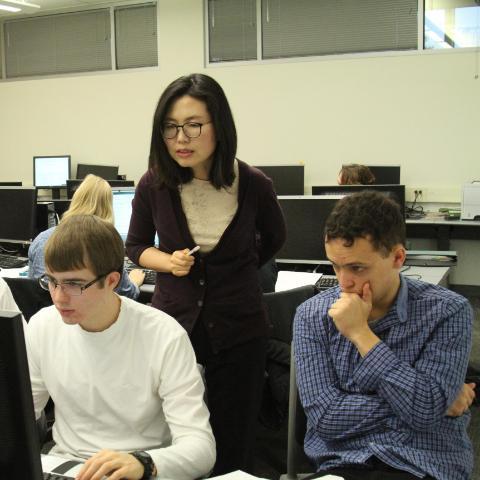Why Study Computer Science?
In computer science you will learn the fundamentals of computation—the science underlying the computing technologies that have become so pervasive in contemporary society. At Wheaton, we believe computer science is not about the technical details of this or that technology, but about problem-solving. As a student in computer science at Wheaton, you'll take an interdisciplinary approach to devising efficient solutions to the puzzles of the world and prepare for a variety of exciting career opportunities in this growing field.
Why Study Computer Science at Wheaton?
One of the most interdisciplinary fields, computer science connects to work in the sciences, social sciences, literature, and music. It not only provides computing technology aids but trains your mind for the rigorous, logical thinking required by each discipline.
We offer a home-grown curriculum suited for top-quality students, adapted to the liberal arts environment, continuously updated with the changes in technology, and honed to prepare you to compete in the modern marketplace. Explore some of the curricular innovations that provide key classroom experiences.
One of the formative experiences is the software development course, CSCI 335. Most of the work is done in a semester-long group project where you’ll produce a major piece of software.
Software engineering courses are common in computer science programs but Wheaton is unusual in placing this experience early in the major. Students jokingly refer to the course as "sophomore development." View some of the software development projects students have worked on.
What are Wheaton computer science majors like? As a student in our department, one of the most important aspects of your experience here is your peers. Check out the profiles of some recent and current computer science majors and minors.
- Computer Science Lab: Most of the work in computer science courses is done in the computer science lab, a sunny spot with 24 workstations with 22-inch flat screens and running CentOS Linux.
- Programming Competitions: You’ll have the opportunity to participate in regular programming competitions at Wheaton. Most competitions use a similar format — each team is provided with a single computer and a stack of problems and whoever can write programs solving the most problems in the allotted time wins.
- CSCI Club: a club that fosters community among computer science majors.
- Teaching assistantships: an opportunity to help fellow students thrive.
- Global & Experiential Learning – semester study abroad programs, summer study abroad programs, spring break co-curricular trips
- Human Needs and Global Resources: Cultivate a commitment to justice, intercultural humility, compassion, hospitality, environmental health, and peacemaking through multi-disciplinary coursework, a six-month international internship, and whole-person formation.
What Will I Learn?
The curriculum in computer science presents the fundamentals of computation—the science underlying the computing technologies that have become so pervasive in contemporary society. This foundation better prepares one to make choices about how those technologies can and should be applied, at the organizational and societal levels as well as individually. The deeper study required of a Computer Science major provides experience in the discipline’s methods of analysis and problem-solving. Furthermore, experimental work throughout the curriculum allows majors to develop skills in the design, analysis, and development of software systems, and so provides excellent preparation for a computing-related career as well as for graduate study in computer science or engineering.
Programming is for everyone. Our Computer Science minor can serve your needs for learning about computation and applying it to your discipline. A minor requires 20 hours of related coursework at the 200-level or higher.
Consult the course catalog for full listing of current courses available in this field.



